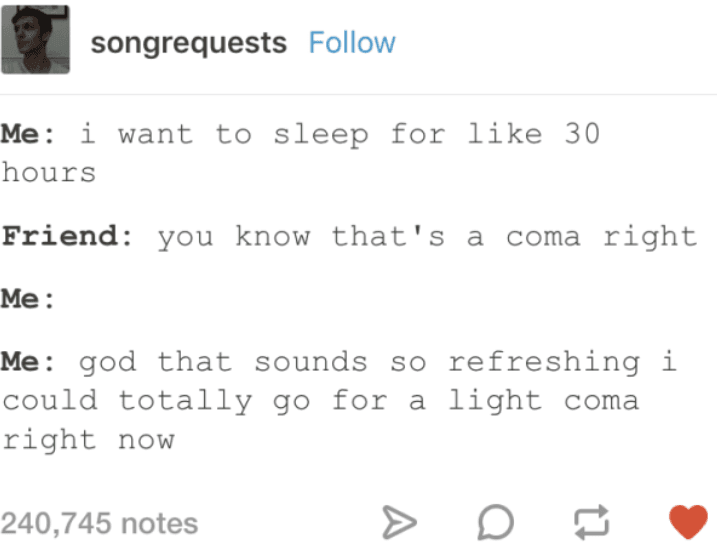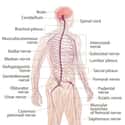-
(#1) Your Nervous System Has Stopped Transmitting Signals To Your Brain
Though you may think you've somehow cut off circulation when your leg has fallen asleep, the numbness you're experiencing has to do with your nervous system rather than your circulatory system. According to IFL Science, when your body is contorted into a strange position, it's common for sensory nerves to get compressed. After some time, the brain will stop receiving signals from that limb.
When the brain doesn't receive any signals from a certain area, the area will feel numb. The tingling or “pins and needles” sensation occurs when the sensory nerves are no longer compressed, and your brain receives a rush of information.
That, however, does not mean the circulatory system cannot affect your nervous system. If a blood vessel becomes restricted, nerves may not receive the needed oxygen. In such a case, the nerves in the area will stop sending signals to the brain.
-
(#6) Menopause Can Worsen Cases Of Paresthesia
As if hot flashes weren't enough, menopause can also cause paresthesia and peripheral neuropathy, according to 34 Menopause Symptoms. Menopausal women may have enlarged blood vessels that could press onto nerves and cut off circulation.
Postmenopausal women are particularly at risk for carpal tunnel, a form of peripheral neuropathy localized in a person's hands because their wrist structure becomes enlarged and places undue stress on the nerves.
-
(#8) In Rare Cases, Paresthesia Can Be A Symptom Of A Worse Condition
Though it usually isn’t something to fear, tingling can be a sign of peripheral neuropathy, a type of nerve damage. Peripheral neuropathy tends to be a symptom of many other diseases. According to Everyday Health, it's a condition highly associated with diabetes; when a person with type 2 diabetes has high blood sugar for prolonged periods, they experience tingling in their feet and hands, and often it spreads to their arms or legs. If blood sugar levels are not controlled, then numbness can turn to pain and swelling.
Peripheral neuropathy can stem from a variety of other serious conditions, including kidney problems, liver disease, or even tumors that are pressing on nerves. Lyme disease, HIV, and Lupus may also be tied to peripheral neuropathy.
-
(#9) Vitamin Levels In The Body Can Contribute To Paresthesia
B vitamins, particularly B6 and B12, and vitamin E are considered essential to your nervous system. According to the National Institutes of Health, a deficiency in B12 can cause numbness and tingling in hands and feet, but in extreme cases, can also lead to peripheral neuropathy.
It's all about balance, however. If you have too much B6, the same can happen. A B12 deficiency is more common for older adults since their bodies have a harder time absorbing vitamins from foods. This makes it more likely that they will experience a form of peripheral neuropathy.
-
(#4) Hitting Your 'Funny Bone' Affects The Same Nerves As Paresthesia
When you knock what's commonly known as your “funny bone," you're hitting the ulnar nerve, which branches all the way from the spine to the tips of the fingers. Residing in a small section of the arm called the medial epicondyle that sits between the bone on your upper arm, called the humerus, and the two bones that make your forearm, the radius and ulna, the nerve is exposed without much protection from bone or muscle.
Due to its exposure, it's uncomfortable when you hit the ulnar nerve, as the BBC explains. When your arm falls asleep, it's the same ulnar nerve that’s being affected, thus the same tingling.
-
(#7) Passing Out After Drinking Could Cause Long-Lasting Paresthesia
Generally, waking up to a tingly arm or leg won’t hurt you, because your body is doing its job. Your body wakes you up to alert you that your nerves have been compressed, so you can move them out of that position. When someone falls asleep after drinking, however, their body may not alert them to the problem.
If you pass out after a few drinks for an extended period and compress your nerves the entire time, it could result in “Saturday night palsy.” According to the National Center for Emergency Medicine Informatics, due to extended damage, the paralyzed feeling might last as long as a couple of days to months. For the feeling to stop, the body must repair the nerves' protective coating, called the myelin.
New Random Displays Display All By Ranking
About This Tool
When a person sleeps, his body also enters a state of rest, and there will be no abnormalities under normal circumstances. However, many people shared that they always feel numbness or pain in their limbs when they are sleeping. Sometimes the discomfort can be quickly relieved by moving after wake up, but sometimes the symptoms can't be improved for a long time. What is going wrong?
In fact, there are many reasons for this symptom, such as prolonged sitting or improper sleeping posture that affects normal blood circulation. The random tool lists 9 reasons why our limbs painful during sleeping, we recommend that you'd better go to the hospital for a physical examination if you have persistent discomfort.
Our data comes from Ranker, If you want to participate in the ranking of items displayed on this page, please click here.
















